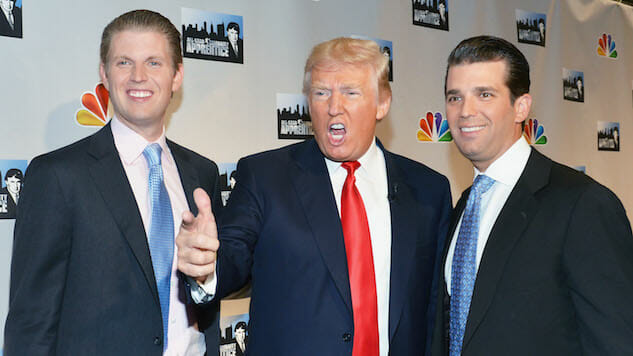Trump’s Tax Cuts Give Corporate CEO’s “Eye-Popping” Paychecks but the Money Won’t Trickle Down
Photo by Slaven Vlasic/Getty Politics News Tax Cuts
Trump claimed his 2017 Tax Cut and Jobs Act would cut taxes for everyone, including the middle-class—however, corporate CEOs are reaping all of the benefits while middle-class tax cuts are set to expire in 2026. Following the tax cuts, corporate CEOs have been pulling in major paychecks thanks to their companies buying back their own stocks.
According to SEC filings this year, share buybacks have hit a record high on Wall Street and are projected to increase. Head of strategic research and analysis at Institutional Shareholder Services Pat McGurn predicted, “It is going to be a parade of eye-popping numbers.” When a company buys back its own stock, it ultimately raises the value and price of its shares, so the executives who are paid in stocks are receiving major paychecks.
According to SEC Commissioner Robert Jackson:
There is clear evidence that a substantial number of corporate executives today use buybacks as a chance to cash out the shares of the company they received as executive pay. In fact, twice as many companies have insiders selling in the eight days after a buyback announcement as sell on an ordinary day.
The biggest CEO paycheck thanks to the tax cut and buybacks so far went to the CEO of Oracle Corp., Safra Catz, who sold $250 million worth of shares after the company announced its $12 million share buyback. At the same company, product development head Thomas Kruian sold $85 million worth of shares. Mastercard experienced its largest single cash-out by an executive in over 10 years when CEO Ajay Banga sold $44.4 million of stock in May. Executives of these companies often reap the benefits of the buybacks quickly. For example, Eastman Chemical announced that it planned to buy back $2 billion worth of its own stock and just two days later, CEO Mark Costa sold 55,000 of the company’s shares and received a $5.4 million payout.
Company executives are required to disclose their share purchases and sales to the SEC within two business days of the transaction. Despite an increase in buybacks, companies claim that their executives’ purchases are scheduled and routine, such as Banga, who has sold his shares every year in May since 2013.
Despite the massive paychecks CEOs are receiving, the Trump administration has adamantly insisted that the tax cut benefits will “trickle down” into the middle and working classes.
The White House’s chief economic advisor Gary Cohen said:
I don’t believe that we’ve set out to create a tax cut for the wealthy. If someone’s getting a tax cut, I’m not upset that they’re getting a tax cut. I’m really not upset. We create wage inflation, which means the workers get paid more; the workers have more disposable income, the workers spend more. And we see the whole trickle-down through the economy, and that’s good for the economy.
However, the benefits of the tax cuts aren’t trickling down and probably won’t. Throughout history, trickle-down economics have proven to be a failure. In the 1920s, Presidents Warren Harding and Calvin Coolidge implemented the Mellon Plan, drastically cutting taxes for the wealthiest Americans. Coolidge said, “The wise and correct course to follow in taxation and all other economic legislation is not to destroy those who have already secured success but to create conditions under which every one will have a better chance to be successful.” Following a brief high known as the Roaring 20s, the frivolity collapsed and the U.S. fell into the Great Depression. A recent five-year trickle-down economics experiment in Kansas failed and resulted in a $350 million budget gap. In 2017, Republican lawmakers in Kansas called the experiment a failure and reset taxes to what they once were.
As for the current tax cuts and trickle-down economics, corporate executives are clinging to their cash. So far, barely any of the benefits have trickled down to their employees. After the influx of cash, over two dozen companies have announced plans to give their employees one-time bonuses. However, wage growth still stands at only 2.7 percent. 28 percent of the companies in the S&P 500 claimed they would return “some of their tax savings” to their shareholders instead of their employees.
No matter who gets their hands on the miniscule amount of trickle-down cash, it will simply be a short-lived, Roaring 20s-esque high. In 2026, the tax cuts for the middle-class will end and taxes will rise to what they once were, but the tax cuts for companies are permanent. CEOs will continue to reap the benefits of lower taxes while working Americans twiddle their thumbs and wait for something to trickle down.
Most companies have declined to comment on the buybacks, but Mastercard spokesman Seth Eisen said, “You’re trying to make a connection where one doesn’t exist. There’s nothing notable about this transaction.”
Despite all of the evidence, the president of a Washington analysis firm called Capital Alpha Charles Gabriel said the buyouts and CEO paychecks “will unlikely prove decisive this fall, with the Trump message machine on the improving economy.” Yet he still believes it “will become a hardened talking point for House Democrats in their campaign messaging.”